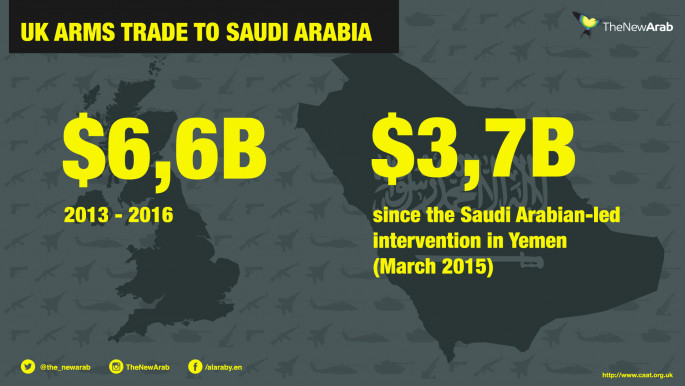Court to review British-Saudi arms sales as Yemen collapses
The three-day hearing is expected to take place in the High Court in London on February 7, 8 and 10.
The judicial review comes amid allegations of widespread civilian deaths at the hands of the Saudi-led coalition in Yemen.
An application for the review submitted by Campaign Against Arms Trade [CAAT] was granted in June.
"For almost two years now, the UK has been complicit in the destruction of Yemen," Andrew Smith, spokesman for CAAT said.
"UK fighter jets and bombs have played a central role in the bombardment, and UK political support has helped to underpin and legitimise it."
The Saudi kingdom has been by far the largest buyer of UK arms.
Its forces in Yemen are using UK licensed fighter jets, bombs and missiles in the ongoing war, which, according to the UN, accounts for at least 50 percent of civilian deaths.
 |
For almost two years now, the UK has been complicit in the destruction of Yemen |  |
"The UK has supported the Saudi-led bombing right from the start," Smith said, "The message it has sent to the Saudi Monarchy is one of uncritical support, and the message it has sent to those being killed in Yemen is that their rights, and their lives, are of less importance than arms company profits.
"We are always being told that the UK stands for free speech and democracy, yet it has sold billions of pounds worth of arms to one of the most brutal and repressive regimes in the world to use against one of the poorest countries in the region."
 |
 |
The UK has supported the Saudi-led bombing right from the start... The message it has sent to the Saudi Monarchy is one of uncritical support, and the message it has sent to those being killed in Yemen is that their rights, and their lives, are of less importance than arms company profits |  |
Rights group have called for an immediate suspension of British arms sales to the Saudi kingdom.
In December, the Saudi-led coalition admitted using British-made cluster bombs, in its campaign against the Houthi rebels in Yemen.
Cluster bombs contain multiple sub-munitions, which sometimes do not explode and become de facto landmines that can kill or maim long after being dropped.
Britain is party to the 2008 Convention on Cluster Munition which bans their use.
London-based Amnesty International alleged that "at least 16 civilians – including nine children – have been killed injured by cluster sub-munitions between July 2015" and May of this year.
New York-based Human Rights Watch said the British-made cluster munitions had been transferred years ago and are no longer sold to Saudi Arabia, but that Britain continues to sell other weapons to Saudi Arabia "despite the clear risk" of their use in future coalition attacks.
The review next week will pose a rare occasion to scrutinise the UK's arms export to Saudi Arabia.
It calls on the Department of International Trade to suspend extant licences and stop issuing any further arms export licences to the Saudi kingdom for weaponry for use in the war on Yemen.







 Follow the Middle East's top stories in English at The New Arab on Google News
Follow the Middle East's top stories in English at The New Arab on Google News


